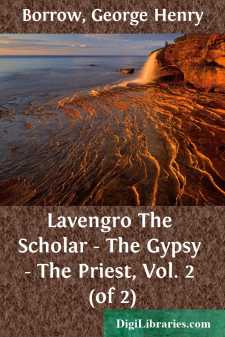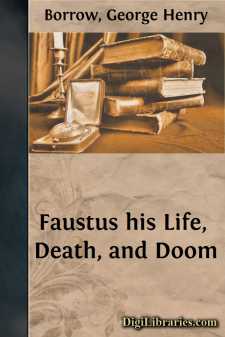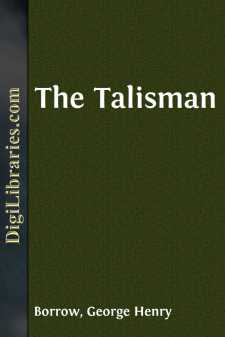Categories
- Antiques & Collectibles 13
- Architecture 36
- Art 48
- Bibles 22
- Biography & Autobiography 813
- Body, Mind & Spirit 142
- Business & Economics 28
- Children's Books 15
- Children's Fiction 12
- Computers 4
- Cooking 94
- Crafts & Hobbies 4
- Drama 346
- Education 46
- Family & Relationships 57
- Fiction 11828
- Games 19
- Gardening 17
- Health & Fitness 34
- History 1377
- House & Home 1
- Humor 147
- Juvenile Fiction 1873
- Juvenile Nonfiction 202
- Language Arts & Disciplines 88
- Law 16
- Literary Collections 686
- Literary Criticism 179
- Mathematics 13
- Medical 41
- Music 40
- Nature 179
- Non-Classifiable 1768
- Performing Arts 7
- Periodicals 1453
- Philosophy 64
- Photography 2
- Poetry 896
- Political Science 203
- Psychology 42
- Reference 154
- Religion 513
- Science 126
- Self-Help 84
- Social Science 81
- Sports & Recreation 34
- Study Aids 3
- Technology & Engineering 59
- Transportation 23
- Travel 463
- True Crime 29
Lavengro The Scholar - The Gypsy - The Priest, Vol. 2 (of 2)
Categories:
Description:
Excerpt
CHAPTER XLIX
Singular Personage—A Large Sum—Papa of Rome—We are Christians—Degenerate Armenians—Roots of Ararat—Regular Features.
The Armenian! I frequently saw this individual, availing myself of the permission which he had given me to call upon him. A truly singular personage was he, with his love of amassing money, and his nationality so strong as to be akin to poetry. Many an Armenian I have subsequently known fond of money-getting, and not destitute of national spirit; but never another who, in the midst of his schemes of lucre, was at all times willing to enter into a conversation on the structure of the Haik language, or who ever offered me money to render into English the fables of Z--- in the hope of astonishing the stock-jobbers of the Exchange with the wisdom of the Haik Esop.
But he was fond of money, very fond. Within a little time I had won his confidence to such a degree that he informed me that the grand wish of his heart was to be possessed of two hundred thousand pounds.
“I think you might satisfy yourself with the half,” said I. “One hundred thousand pounds is a large sum.”
“You are mistaken,” said the Armenian, “a hundred thousand pounds is nothing. My father left me that or more at his death. No, I shall never be satisfied with less than two.”
“And what will you do with your riches,” said I, “when you have obtained them? Will you sit down and muse upon them, or will you deposit them in a cellar, and go down once a day to stare at them? I have heard say that the fulfilment of one’s wishes is invariably the precursor of extreme misery, and forsooth I can scarcely conceive a more horrible state of existence than to be without a hope or wish.”
“It is bad enough, I dare say,” said the Armenian; “it will, however, be time enough to think of disposing of the money when I have procured it. I still fall short by a vast sum of the two hundred thousand pounds.”
I had occasionally much conversation with him on the state and prospects of his nation, especially of that part of it which still continued in the original country of the Haiks—Ararat and its confines, which, it appeared, he had frequently visited. He informed me that since the death of the last Haik monarch, which occurred in the eleventh century, Armenia had been governed both temporally and spiritually by certain personages called patriarchs; their temporal authority, however, was much circumscribed by the Persian and Turk, especially the former, of whom the Armenian spoke with much hatred, whilst their spiritual authority had at various times been considerably undermined by the emissaries of the Papa of Rome, as the Armenian called him.
“The Papa of Rome sent his emissaries at an early period amongst us,” said the Armenian, “seducing the minds of weak-headed people, persuading them that the hillocks of Rome are higher than the ridges of Ararat; that the Roman Papa has more to say in heaven than the Armenian patriarch, and that puny Latin is a better language than nervous and sonorous Haik.”
“They are both dialects,” said I, “of the language of Mr. Petulengro, one of whose race I believe to have been the original founder of Rome; but, with respect to religion, what are the chief points of your faith? you are Christians, I believe.”
“Yes,” said the Armenian, “we are Christians in our way; we believe in God, the Holy Spirit, and Saviour, though we are not prepared to admit that the last Personage is not only Himself, but the other two. We believe. . . ” and then the Armenian told me of several things which the Haiks believed or disbelieved. “But what we find most hard of all to believe,” said he, “is that the man of the mole hills is entitled to our allegiance, he not being a Haik, or understanding the Haik language.”
“But, by your own confession,” said I, “he has introduced a schism in your nation, and has amongst you many that believe in him.”
“It is true,” said the Armenian, “that even on the confines of Ararat there are a great number who consider that mountain to be lower than the hillocks of Rome; but the greater number of degenerate Armenians are to be found amongst those who have wandered to the West; most of the Haik Churches of the West consider Rome to be higher than Ararat—most of the Armenians of this place hold that dogma; I, however, have always stood firm in the contrary opinion.”
“Ha!...












